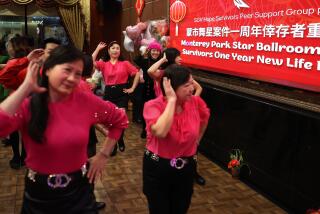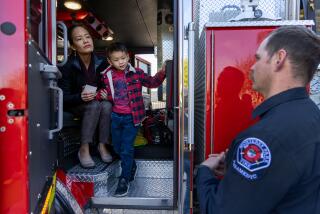For Victims of Violence, Aftermath Is Ordeal : Crime: After enduring the physical pain, they face emotional upheaval. They live with fear, nightmares and anxiety, and worry about being attacked again.
- Share via
Their faces obscured behind tinted glass, the assailants screamed as their car rounded a street corner. Suddenly, a gunman leaned out and fired a hail of bullets at Fernando Arellano and his girlfriend.
“I looked back and saw that guy shooting at us,” said Arellano, recalling the recent Sunday night drive-by shooting in south Buena Park.
“We hit the (ground) and I fell almost on top of her and then I heard two shots hit my leg. . . . I was on the ground and I could see bullets hitting everywhere. Bullets were ricocheting and hitting cars. I could smell the gunpowder.”
A third bullet ripped into Arellano’s hip. His girlfriend was unharmed.
The gunmen roared off, and the 26-year-old man left bleeding in a parking lot had become another casualty of violent crime in Orange County.
From drive-by shootings to street fights and bloody confrontations in the home, about 600 people a year are victims of shootings or stabbings--a tally that has nearly doubled between 1987 and 1991, according to the Orange County Emergency Medical Services office.
But after the police finish their investigations and any news media interest has passed, the victims are largely forgotten. They are left to mend, physically and mentally.
Often, the psychological healing is hardest.
They live with fear, nightmares and anxiety. While some victims feel vulnerable to another attack, others are frustrated and angry. Daily routines are plagued with haunting memories.
Most victims “have absolutely no idea what the long-term impact of violence is doing,” said Christine Lopez, a supervisor in the county’s Victim Witness Assistance Program, which provides aid to thousands of victims and their families each year. “We do need to look at that and recognize those who are maimed and injured.”
Males usually between their middle teens and early 30s in urban areas are most commonly the victims of gunfire or stabbings, said doctors at the county’s three trauma centers--Western Medical Center-Santa Ana, Mission Hospital Regional Medical Center in Mission Viejo and UCI Medical Center in Orange.
After their hospital stays, many victims are eager to get on with their lives. But it is not that easy.
“I just sort of want to get along with my life,” said Rollin George Britton, 45, who was shot in the right leg last November by a gunman who jumped out of the bushes at his Huntington Beach apartment complex.
Britton now gets around with the aid of crutches. Several metal “halos,” or rings, surround the outside of his leg and help hold part of his leg bone together, he said. The pain continues.
Memories of the shooting cause him to have mood swings, Britton said. “I get depressed and sometimes I get angry and hard to get along with.”
It’s like that for Jaime Vasquez too.
The 26-year-old security guard at a Santa Ana restaurant and bar was working when he was wounded in a drive-by shooting last year. The bullet entered the rear of his head, exited by his ear and struck a second security guard, killing him.
“I decided to stay on the ground until the ambulance came,” Vasquez said. “They were a while in coming, and I thought I’d better not close my eyes because I was afraid I’d die,” he said, his eyes growing wide with the memory.
His thick, black curls now cover two small scars on his scalp. But the invisible scars cut to his core.
“I have problems at night--nightmares, sweats,” Vasquez said.
“I’m more violent now, including with my family. Because of that I go to a psychiatrist,” he said. “I don’t feel 100% better.”
Cecilia Carranco, 21, worries she never may be free of the haunting memories of the shooting that temporarily crippled her.
“Always in my life I am going to feel this” fear, she lamented. She has had nightmares of flowing blood and agonized people after she was wounded in both legs in a drive-by shooting last year.
It happened in Santa Ana, when a gunman in a black car fired into a crowd where she stood.
“Sometimes I can’t sleep,” she said. “Sometimes when I enter a place I feel that something is going to happen to me. And sometimes I feel something is going to happen to me when a car passes,” she said from the same apartment couch where she lay months earlier with her legs bandaged and swollen after a 9-millimeter bullet tore through them.
Arellano and other victims whose attackers have not been captured are left with gripping fears about their security, and they suffer visions that their attackers might find them again.
“I don’t want the bad guys to come after me because I just want to get well and start work and support my family,” said Arellano, a thin, muscular furniture company warehouseman who walks with a slight limp from his wound.
He has changed his daily routine. He no longer takes his year-old son, Joseph David Arellano, to the local park. He is even afraid of going to the local store to buy milk.
“Right now I’m a little scared and I don’t want to feel that way,” Arellano said. “I want to be able to take my little boy to the park. I got to wait to let all my fear go so I can feel comfortable again.
“Driving out in the streets, that scares me a little bit. . . . I don’t go out much,” he said. “I just stay home now. I just go to the doctor’s and back.”
Along with physical pain and emotional upheaval, many victims find that their trauma is expensive. Hospital bills mount, and during convalescence, so do regular bills--telephones, rent, food and clothes.
“My economic situation is destroyed. . . . The situation is critical,” said Vasquez, who continues to work as a security guard for $5.50 an hour. He and his girlfriend, Eva, who plan to marry next month, have had to rely on family members for food for their children, a year-old boy and 4-year-old girl.
Vasquez has about $30,000 in bills from Western Medical Center-Santa Ana, where he stayed for 12 days after the shooting. “Now they don’t want to see me, they want me to pay. . . . How am I going to pay that?”
More to Read
Sign up for Essential California
The most important California stories and recommendations in your inbox every morning.
You may occasionally receive promotional content from the Los Angeles Times.













